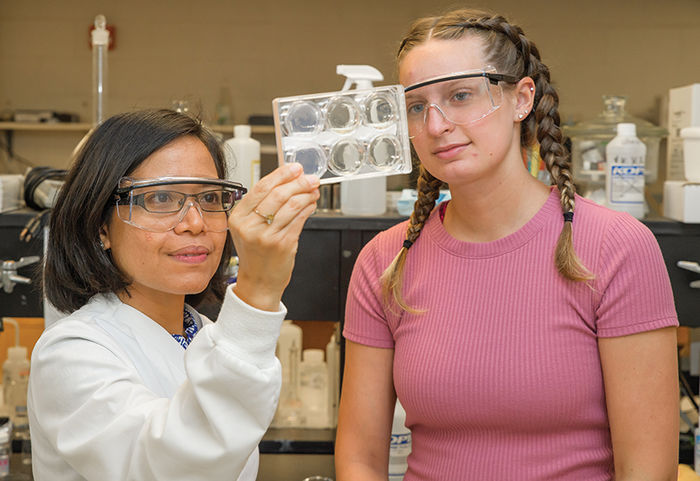When Aaron Trail, who graduated from Penn State Behrend in May of 2021 with a degree in Biology and a minor in Chemistry, went to job interviews after graduation, there was one thing that every potential employer wanted to talk about: his research experience with Dr. Mary Grace Galinato, associate professor of chemistry.
“They seemed extremely excited about my research and lab work, because it isn’t common for undergraduate students to have that experience and even more rare for a biology major to have worked in a chemistry research lab,” said Trail, who won first place in the Chemistry division at Behrend’s 2021 Sigma Xi Undergraduate Research and Creative Accomplishment Conference for his work with Galinato.
Galinato received a three-year, $70,000 grant from the American Chemical Society-Petroleum Research Fund to develop an artificial manganese protein catalyst that can remove sulfur from petroleum-based substances. At least 40 percent of those funds are to be used to pay students—a win-win since they not only gain valuable lab experience, but get a paycheck, too. Seven students have benefited so far.
Crude oil naturally contains sulfur, which has several adverse effects: It corrodes parts of internal combustion engines, generates pollution, and promotes the formation of acid rain.
“We would like to develop an artificial manganese protein catalyst that can effectively remove sulfur from petroleum-based substances,” Galinato said. “The catalyst would be eco-friendly, more stable than a traditional water-based protein, and potentially reusable. This can be achieved by encasing the catalyst in a gel material made of silica.”
The student researchers help Galinato by preparing and purifying the artificial proteins and creating experimental conditions to optimize their encapsulation.
“It’s a great learning experience that is completely different from coursework labs,” Trail said. “Sometimes, problems aren’t easily fixed, and nobody has an answer. That’s when you must use the skills and knowledge you learned in class to figure them out. Research work really pushes you, and it’s probably the most rewarding and enlightening experience I had at Behrend.”
Olivia Steinbeck, a junior Chemistry major, worked full time on the project last summer.
“It helped me build my lab skills and learn how to use the different instruments that are available to chemistry students,” Steinbeck said. “It also gave me the opportunity to learn about biomolecules and how they affect chemical processes.”
Most of the student researchers have been Chemistry majors, but Galinato said the project is interdisciplinary, not limited to chemistry alone. It encompasses biochemistry, supramolecular chemistry, and spectroscopy, and even extends to engineering as well as materials and polymer science.
“I want students to realize that collaborative efforts across disciplines are sometimes necessary for success,” Galinato said. “Research work also helps students apply what they have learned in the classroom and forces them to think critically and discover new concepts.”
Galinato is happy to put so many students to work, and she’s excited about the potential outcome and how it might lead to positive change.
“I hope to raise awareness of utilizing environmentally-friendly catalysts and provide the scientific community with an alternative means for studying desulfurization reactions,” Galinato said. “This research paves the way for generating structurally tunable catalysts that may be employed under different reaction conditions.”
